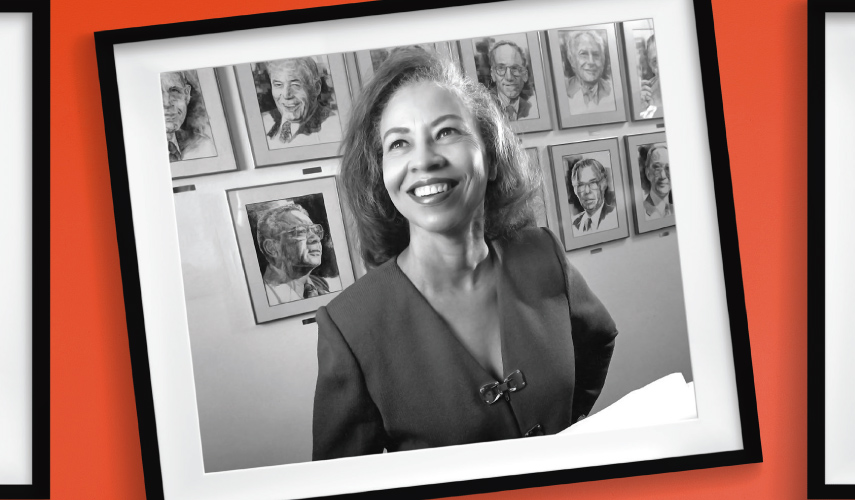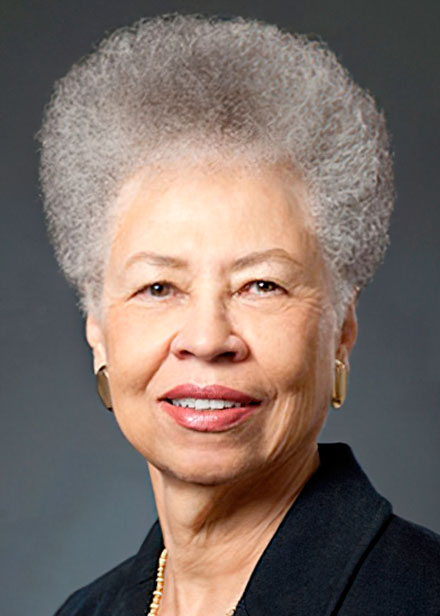
Thought Leadership
Leadership Advice from a Higher Education Disruptor
In honor of Black History Month, we are proud to celebrate the legacy of a trailblazing leader who not only shattered numerous glass ceilings but also played a pivotal role in shaping CampusWorks’ growth from its infancy in 1999.
Del Anderson Handy’s journey is a story of resilience and audacity, a tale that began in the deep-seated racial divides of rural Mississippi. As a young black student facing the harsh realities of segregation, Del encountered bigotry head-on. Her defiant response to a history professor who was espousing racist philosophies at Alcorn College showcased the formidable power of her voice. At the tender age of 19, Del penned a courageous manifesto that led to the temporary shutdown of her college in 1957, an act that resulted in her expulsion and academic transcript bearing 16 units of “F.” Yet, this moment of adversity was a catalyst, igniting a transformative career that would impact higher education profoundly.
Del’s ascent through academia is storied and inspirational. Breaking new ground as the first woman to preside over San Jose City College and as the first African-American and woman Chancellor of City College of San Francisco, her path is a beacon of leadership wisdom and the potential for positive disruption.
During CampusWorks’ All Hands Meeting this past January, Del honored us with readings from her memoir, Jump Time!, imparting invaluable lessons for overcoming challenges and effecting meaningful change. We are honored to share her distilled wisdom.
- Master the English Language: Whether it was speaking out against a racist professor or speaking up for underserved communities, Del’s experiences demonstrate the power of words to change the world. Not surprisingly, she encourages everyone, even native English speakers, to master the English language because, as she’s proven, articulate speech can amplify a leader’s influence, transforming ideas into impactful actions.
- Invest in People: Del’s career illustrates the importance of nurturing talent, with her own mentees achieving remarkable positions of leadership. At least twelve administrators who worked under her supervision became college presidents and two became high-level administrators in the Obama Administration Education Department. Del believes that leaders who invest time and effort into developing their teams build a foundation for collective success.
- Embrace Your Weaknesses: At every stage of her career, Del was keenly aware of her own weaknesses and worked to bridge gaps in her skills and experience. At many points she jumped into the unknown, stepping into roles and stepping up for initiatives that felt intimidating. While, at times, she questioned her qualifications, she never doubted her ability to learn her way forward. Nor did she shy away from her shortcomings. Instead, she spoke of them openly during job interviews, wanting to demonstrate that she had nothing to hide. This approach earned her respect and many “stretch” opportunities that contributed to her growth. For these reasons, Del encourages everyone to embrace their weaknesses and do something about them.
- Hone Your Listening Skills: Del considers listening to be a prerequisite to many critical leadership skills. “Listening shows respect for others, affirms their worth, and adds to the storehouse of ideas for all to consider.” Her graduate education was grounded in Theodore Reik’s concept of “listening with the third ear,” where mental health professionals learned to hear the deeper layers of meaning in both verbal and non-verbal communication. Del suggests that listening with a ‘third ear’ can lead to deeper understanding and empathy, which are key traits of effective leadership.
- Take Reasonable Risks: Del’s willingness to step outside her comfort zone was instrumental in her path to leadership. One such risk was applying for the position of Chief Academic Officer at Skyline College in California, a new role that had previously been done by two full-time vice presidents. At that point in her career, Del had been a student services administrator and had twice been rejected for the chief academic officer role at other institutions. Despite the risk of rejection — and the even bigger risk of being hired for such a monumental posting with no instructional leadership experience — Del knew the growth opportunity would be pivotal for her career and decided the position was a risk worth taking. And it paid off when she was offered the job. During her time in that role, she encountered detractors and saboteurs, but her many successes exemplify how taking calculated risks can propel one’s career forward.
- Be a Disruptor When Necessary: The most profound lesson from Del’s career is perhaps the power of constructive disruption. Her expulsion from college set her on a path of deep self-reflection and redefinition, which ultimately led to her significant accomplishments. One such example took place when she was just three months into her appointment as Chancellor of City College of San Francisco. Del was invited to help lead a $150 million bond campaign, something she’d never done before, to raise money to improve district facilities at the City College of San Francisco. After seeing the poor conditions at some of the campuses, she jumped at the chance to transform the college for students and faculty — and learn new skills in the process.
- Do More Than Required: Del’s initiative to improve systems and facilities showcases how extra effort can lead to lasting impact. Earlier in her career, Del had a vision for computer-assisted advising software that would enable the electronic transfer of student information between public community colleges and four-year colleges and universities and provide students with digital access to information they could use in preparing for transfer. Though the U.S. Department of Education rejected her funding proposals three times, she found support for the idea at the University of California Irvine, where ASSIST was born and then widely adopted across California.
At CampusWorks, we are honored that Del’s legacy is part of our own. She joined CampusWorks in 1999 as the Founding Vice President for Strategic Planning, making her our second employee. Her leadership and vision were instrumental in launching the organization. Twenty-five years later, Del’s influence still resonates across the company, her journey a reminder that each of us possesses the power to transform adversity into opportunity, turn challenges into achievements, and disrupt for the greater good.
Del Handy

Del Anderson Handy has 27 years of higher education experience in California. Early in her career, Del served as vice president of Skyline College and later became president of San Jose City College. In 1995, Anderson became the first woman president of the 77,000-student City College of San Francisco (CCSF), from which she retired in 1998. Del earned both her BS in early childhood education and teaching and her MSW in social work and community organizing from San Diego State University.

